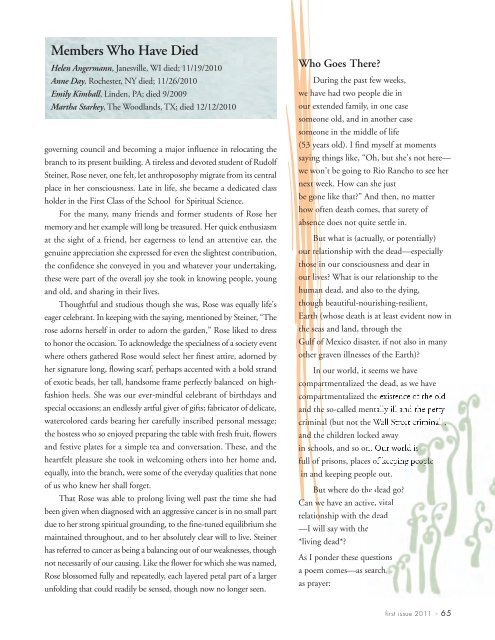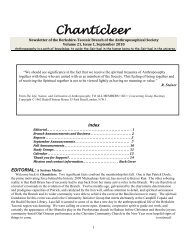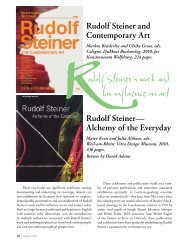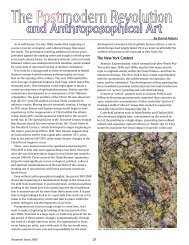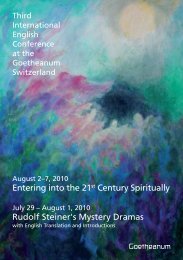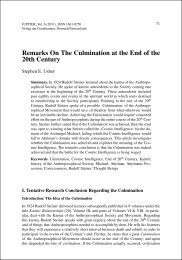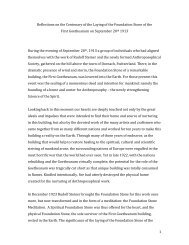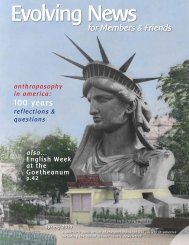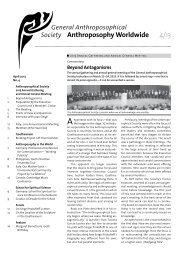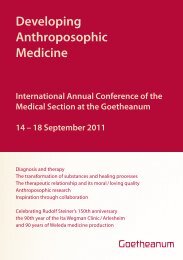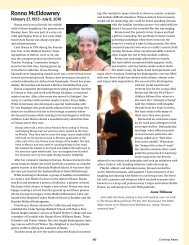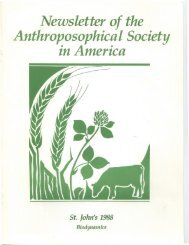Rudolf Steiner's Vision for the Future - Anthroposophical Society in ...
Rudolf Steiner's Vision for the Future - Anthroposophical Society in ...
Rudolf Steiner's Vision for the Future - Anthroposophical Society in ...
You also want an ePaper? Increase the reach of your titles
YUMPU automatically turns print PDFs into web optimized ePapers that Google loves.
Members Who Have Died<br />
Helen Angermann, Janesville, WI died; 11/19/2010<br />
Anne Day, Rochester, NY died; 11/26/2010<br />
Emily Kimball, L<strong>in</strong>den, PA; died 9/2009<br />
Martha Starkey, The Woodlands, TX; died 12/12/2010<br />
govern<strong>in</strong>g council and becom<strong>in</strong>g a major <strong>in</strong>fluence <strong>in</strong> relocat<strong>in</strong>g <strong>the</strong><br />
branch to its present build<strong>in</strong>g. A tireless and devoted student of <strong>Rudolf</strong><br />
Ste<strong>in</strong>er, Rose never, one felt, let anthroposophy migrate from its central<br />
place <strong>in</strong> her consciousness. Late <strong>in</strong> life, she became a dedicated class<br />
holder <strong>in</strong> <strong>the</strong> First Class of <strong>the</strong> School <strong>for</strong> Spiritual Science.<br />
For <strong>the</strong> many, many friends and <strong>for</strong>mer students of Rose her<br />
memory and her example will long be treasured. Her quick enthusiasm<br />
at <strong>the</strong> sight of a friend, her eagerness to lend an attentive ear, <strong>the</strong><br />
genu<strong>in</strong>e appreciation she expressed <strong>for</strong> even <strong>the</strong> slightest contribution,<br />
<strong>the</strong> confidence she conveyed <strong>in</strong> you and whatever your undertak<strong>in</strong>g,<br />
<strong>the</strong>se were part of <strong>the</strong> overall joy she took <strong>in</strong> know<strong>in</strong>g people, young<br />
and old, and shar<strong>in</strong>g <strong>in</strong> <strong>the</strong>ir lives.<br />
Thoughtful and studious though she was, Rose was equally life's<br />
eager celebrant. In keep<strong>in</strong>g with <strong>the</strong> say<strong>in</strong>g, mentioned by Ste<strong>in</strong>er, “The<br />
rose adorns herself <strong>in</strong> order to adorn <strong>the</strong> garden,” Rose liked to dress<br />
to honor <strong>the</strong> occasion. To acknowledge <strong>the</strong> specialness of a society event<br />
where o<strong>the</strong>rs ga<strong>the</strong>red Rose would select her f<strong>in</strong>est attire, adorned by<br />
her signature long, flow<strong>in</strong>g scarf, perhaps accented with a bold strand<br />
of exotic beads, her tall, handsome frame perfectly balanced on highfashion<br />
heels. She was our ever-m<strong>in</strong>dful celebrant of birthdays and<br />
special occasions; an endlessly artful giver of gifts; fabricator of delicate,<br />
watercolored cards bear<strong>in</strong>g her carefully <strong>in</strong>scribed personal message;<br />
<strong>the</strong> hostess who so enjoyed prepar<strong>in</strong>g <strong>the</strong> table with fresh fruit, flowers<br />
and festive plates <strong>for</strong> a simple tea and conversation. These, and <strong>the</strong><br />
heartfelt pleasure she took <strong>in</strong> welcom<strong>in</strong>g o<strong>the</strong>rs <strong>in</strong>to her home and,<br />
equally, <strong>in</strong>to <strong>the</strong> branch, were some of <strong>the</strong> everyday qualities that none<br />
of us who knew her shall <strong>for</strong>get.<br />
That Rose was able to prolong liv<strong>in</strong>g well past <strong>the</strong> time she had<br />
been given when diagnosed with an aggressive cancer is <strong>in</strong> no small part<br />
due to her strong spiritual ground<strong>in</strong>g, to <strong>the</strong> f<strong>in</strong>e-tuned equilibrium she<br />
ma<strong>in</strong>ta<strong>in</strong>ed throughout, and to her absolutely clear will to live. Ste<strong>in</strong>er<br />
has referred to cancer as be<strong>in</strong>g a balanc<strong>in</strong>g out of our weaknesses, though<br />
not necessarily of our caus<strong>in</strong>g. Like <strong>the</strong> flower <strong>for</strong> which she was named,<br />
Rose blossomed fully and repeatedly, each layered petal part of a larger<br />
unfold<strong>in</strong>g that could readily be sensed, though now no longer seen.<br />
Who Goes There?<br />
Dur<strong>in</strong>g <strong>the</strong> past few weeks,<br />
we have had two people die <strong>in</strong><br />
our extended family, <strong>in</strong> one case<br />
someone old, and <strong>in</strong> ano<strong>the</strong>r case<br />
someone <strong>in</strong> <strong>the</strong> middle of life<br />
(53 years old). I f<strong>in</strong>d myself at moments<br />
say<strong>in</strong>g th<strong>in</strong>gs like, “Oh, but she’s not here—<br />
we won’t be go<strong>in</strong>g to Rio Rancho to see her<br />
next week. How can she just<br />
be gone like that?” And <strong>the</strong>n, no matter<br />
how often death comes, that surety of<br />
absence does not quite settle <strong>in</strong>.<br />
But what is (actually, or potentially)<br />
our relationship with <strong>the</strong> dead—especially<br />
those <strong>in</strong> our consciousness and dear <strong>in</strong><br />
our lives? What is our relationship to <strong>the</strong><br />
human dead, and also to <strong>the</strong> dy<strong>in</strong>g,<br />
though beautiful-nourish<strong>in</strong>g-resilient,<br />
Earth (whose death is at least evident now <strong>in</strong><br />
<strong>the</strong> seas and land, through <strong>the</strong><br />
Gulf of Mexico disaster, if not also <strong>in</strong> many<br />
o<strong>the</strong>r graven illnesses of <strong>the</strong> Earth)?<br />
In our world, it seems we have<br />
compartmentalized <strong>the</strong> dead, as we have<br />
compartmentalized <strong>the</strong> existence of <strong>the</strong> old<br />
and <strong>the</strong> so-called mentally ill and <strong>the</strong> petty<br />
crim<strong>in</strong>al (but not <strong>the</strong> Wall Street crim<strong>in</strong>al),<br />
and <strong>the</strong> children locked away<br />
<strong>in</strong> schools, and so on. Our world is<br />
full of prisons, places of keep<strong>in</strong>g people<br />
<strong>in</strong> and keep<strong>in</strong>g people out.<br />
But where do <strong>the</strong> dead go?<br />
Can we have an active, vital<br />
relationship with <strong>the</strong> dead<br />
—I will say with <strong>the</strong><br />
*liv<strong>in</strong>g dead*?<br />
As I ponder <strong>the</strong>se questions<br />
a poem comes—as search,<br />
as prayer:<br />
first issue 2011 • 65


